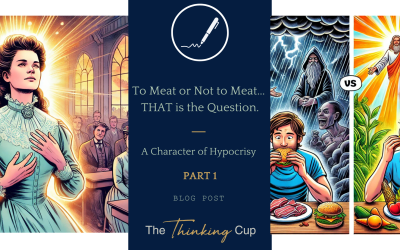Adventism has a gnostic feel to its ‘truth.’ Let me explain what I mean. Gnosticism is a collection of ancient religious ideas and spiritual beliefs that emerged around the first and second centuries AD. It emphasizes personal spiritual knowledge, or gnosis, over orthodox teachings and rituals. Gnostics believed that direct knowledge of the divine, rather than adherence to established doctrine, was the key to salvation and enlightenment.
Gnosis is a Greek term meaning “knowledge,” specifically referring to a profound, intuitive understanding or spiritual insight into the divine. Gnostics valued esoteric or mystical knowledge as the path to salvation. This knowledge was often hidden, requiring guidance from a spiritual teacher and insight into the true nature of existence.
While I do not think Adventism is Gnostic, the belief system has some fascinating parallels. Because of the built-in framework of ‘present truth’ and the Adventist church being a remnant church set apart by God, many doctrines are unique and derived from secret knowledge through their Prophetess Ellen G. White.
The framework teaches that they were given these unique interpretations through the ‘Lord’s Messenger’ (Ellen G. White). Since Ellen G. White claimed that none of her writings contradict scripture, then her writings were “not to give new light, but to impress vividly upon the heart the truths of inspiration already revealed.” [1] Her writings would be the key to unlocking the messages from the Lord. She wrote this statement in Selected Messages Vol. 1:
“The testimonies themselves will be the key that will explain the messages given, as scripture is explained by scripture.” [2]
Speaking directly about the Testimonies for the Church, Ellen writes the following:
In these letters which I write, in the testimonies I bear, I am presenting to you that which the Lord has presented to me. I do not write one article in the paper expressing merely my own ideas. They are what God has opened before me in vision—the precious rays of light shining from the throne.[3]
Ellen G. White, the pioneers of Adventism, the White Estate, and the Adventist Church Proper all believe Ellen’s writings never contradict the Bible because she was given the divine prophetic mantle. Why else would they have a fundamental belief claiming her prophetic gift?
“The Scriptures testify that one of the gifts of the Holy Spirit is prophecy. This gift is an identifying mark of the remnant church and we believe it was manifested in the ministry of Ellen G. White. Her writings speak with prophetic authority and provide comfort, guidance, instruction, and correction to the church. They also make clear that the Bible is the standard by which all teaching and experience must be tested. (Num. 12:6; 2 Chron. 20:20; Amos 3:7; Joel 2:28, 29; Acts 2:14-21; 2 Tim. 3:16, 17; Heb. 1:1-3; Rev. 12:17; 19:10; 22:8, 9.)” [4]
Notice that the Adventist church makes a statement it believes to be accurate and then places ten Biblical texts that supposedly support the previous statement. This is Adventist proof-texting at its finest. Just because you place Scripture next to a statement doesn’t mean the statement is Biblically based.
Because the Adventist framework has perfected the proof-texting method, it shouldn’t surprise me to have heard the following line of thinking from many Adventists:
In a proof text, we should utilize whatever supports our theology while conveniently overlooking everything that contradicts our doctrines and interpretations. Adventism is the truth and Ellen White is a true prophet of God; therefore, Scripture must align with it.
Genesis 26:4-5 is often cited by Adventists to support the idea that the Ten Commandments were in effect before Mt. Sinai and that Abraham and other patriarchs observed them. This interpretation relies on a method known as “proof-texting,” which occurs when someone selectively uses a specific verse or small portion of a biblical text to support a particular doctrine or argument while disregarding the broader context, including the surrounding passages, cultural background, and overall biblical message. This approach can lead to misinterpretation and oversimplification because it does not consider the fuller meaning intended by the original authors.
In this passage, God promises Isaac that He will bless his descendants because Abraham “obeyed my voice and kept my charge, my commandments, my statutes, and my laws.” Adventists interpret “commandments” and “laws” as referring specifically to the Ten Commandments, including the Sabbath, suggesting that Abraham observed these laws. However, a closer look at the scriptural and historical context challenges this interpretation and reveals a broader understanding of God’s expectations.
Contextual Understanding of the Covenant with Abraham
A detailed examination of the Bible shows that Genesis 26:4-5 does not imply that Abraham observed the Ten Commandments in the same form later given at Mt. Sinai. For instance, in Deuteronomy 5:2-3, Moses clarifies that the covenant made at Horeb, which included the Ten Commandments, was explicitly established with the Israelites who were present at that time and “not with our fathers.” This indicates that the covenant, which incorporated the Decalogue, did not apply to the patriarchs, including Abraham, in the same structured way.
Furthermore, in Galatians 3:17, Paul explains that:
“This is what I mean: the law, which came 430 years afterward, does not annul a covenant previously ratified by God, so as to make the promise void.” (Galatians 3:17, ESV)
This reinforces the idea that the Ten Commandments were introduced much later and should not be retroactively applied to Abraham’s time. The law given at Sinai functioned as part of the Old Covenant with Israel, distinct from the promise God made to Abraham.
Abraham’s Obedience: A Broad Concept
The English words translated in Genesis 26:5 – “commandments, statutes, and laws”—do not necessarily refer to the Ten Commandments. Theologians such as Keil and Delitzsch suggest that these terms encompass Abraham’s general obedience to God’s instructions.
“The piety of Abraham is described in words that indicate a perfect obedience to all the commands of God, and therefore frequently recur among the legal expressions of a later date. שָׁמַר מִשְׁמֶרֶת יְהֹוָה “to take care of Jehovah’s care,” i.e., to observe Jehovah, His persons, and His will, Mishmereth, reverence, observance, care, is more closely defined by “commandments, statutes, laws,” to denote constant obedience to all the revelations and instructions of God.” [5]
In other words, Abraham’s obedience was not limited to a written legal code but involved his response to various divine commands as they were communicated. Gordon J. Wenham supports this interpretation by highlighting that the verse emphasizes the thoroughness of Abraham’s faithfulness rather than adherence to a specific set of laws like the Decalogue.
“This verse expands 22:18, “because you have obeyed me.” The additions, “kept my instructions, commandments, statutes, and my laws,” reinforce and underline the extent and thoroughness of Abraham’s obedience.” [6]
The Evolution of God’s Instructions
The concept of “commandments, statutes, and laws” can be understood within the framework of how God’s instructions evolved over time. The biblical narrative suggests a progression in God’s dealings with humanity from a relationship-based covenant with Abraham to the formalization of a legal code with Israel at Sinai. This evolution can be seen in other biblical covenants as well. For example, God’s covenant with Noah involved specific commands regarding dietary laws and the prohibition of bloodshed (Genesis 9:3-6), but it did not include the Ten Commandments.
Abraham’s story in Genesis 12-25 demonstrates numerous acts of obedience that align with divine directives specific to his context. For example:
- In Genesis 12:1-4, Abraham follows God’s command to leave his homeland.
- In Genesis 13:14-17, he is instructed to look over the land God promised to give his descendants.
- In Genesis 14:20, Abraham tithes to Melchizedek, recognizing the priest’s blessing and acknowledging God as the source of his victory.
- In Genesis 17:9-27, Abraham circumcises himself and his household in response to God’s covenantal requirement.
These acts illustrate that Abraham’s obedience consisted of various direct commands rather than adherence to a single codified set of laws. There is no evidence within these accounts to suggest that he kept the Sabbath or followed a formalized legal system akin to the one established at Sinai. Claiming that Abraham kept the Ten Commandments projects one’s own doctrinal beliefs onto the text. This tendency is particularly embraced by Adventist Theology. The Handbook of Seventh-day Adventist Theology is authority enough to make this point:
“The existence of law is implied as a prerequisite to the appearance of sin. While the Ten Commandments as found in Exodus are not specifically spelled out in Genesis, such principles underlie human responsibility.” [7]
This presupposition completely contradicts the clear reading of the Word of God, where Paul uses the Abrahamic promise in his exposition of the Law. He states clearly that the Law of Moses (The Ten Commandments and the other 603 laws given at Mt. Sinai) came 430 years after Abraham.
“This is what I mean: the law, which came 430 years afterward, does not annul a covenant previously ratified by God, so as to make the promise void. For if the inheritance comes by the law, it no longer comes by promise; but God gave it to Abraham by a promise.” (Galatians 3:17–18, ESV)
The Sabbath and the Patriarchal Era
The argument that the patriarchs observed the Sabbath before the Mosaic Law lacks biblical evidence. There is no mention of Sabbath observance by Abraham, Isaac, Jacob, or their descendants prior to Exodus 16, where the Sabbath is introduced explicitly in connection with the manna provision. Jewish and Christian scholars generally agree that Sabbath-keeping was instituted as part of the covenant with Israel, signifying a unique relationship with God following the Exodus.
While some Adventist interpretations attempt to read Sabbath observance into the lives of the patriarchs, a more nuanced view acknowledges that practices such as circumcision, monotheistic worship, and ethical conduct were observed. Still, these did not equate to the formalized structure of the Mosaic Law. Old Testament scholars like Walter Brueggemann pick up on this theme. He points out that the patriarchal narratives focus on the unfolding of God’s promises rather than on adherence to a fixed legal code. Abraham’s actions are better understood as responses to specific divine revelations rather than compliance with a comprehensive law code like the Ten Commandments.
“These promises continue to be reiterated through the generations of Israel, so that they echo and resound with assurance through Israel’s life and Israel’s ongoing testimony. Thus the promises to the ancestors become one basis for the summons made to Moses, in anticipation of the Exodus (Exod 2:24; 3:7, 16; 6:3–8; 33:1).[8]
Understanding Biblical Law in its Historical Context
It is essential to distinguish between different types of biblical laws and how they functioned in the lives of the Israelites. The Ten Commandments are part of the larger Mosaic Law, which includes moral, ceremonial, and civil regulations. While the moral principles embedded in these laws, such as prohibitions against idolatry and murder, reflect God’s timeless character, the specific form of the Ten Commandments served as part of a covenant with Israel. Scholars like John H. Walton [9] and Walter Brueggemann [10] argue that biblical laws must be understood in their ancient Near Eastern context, where covenants often included stipulations specific to the people and time for whom they were intended.
The focus on Abraham’s obedience to “commandments, statutes, and laws” should thus be seen as an acknowledgment of his faithful adherence to God’s will in a pre-Mosaic context. This aligns with the biblical portrayal of Abraham as a model of faith, as noted in Romans 4:3 and Hebrews 11:8-19, where his faith is credited as righteousness due to his trust in God’s promises rather than his adherence to a specific legal code.
It’s important to understand that using Genesis 26:4-5 to argue that the Ten Commandments were in effect before Mt. Sinai and that Abraham observed them is not supported by the broader biblical narrative. The passage emphasizes Abraham’s overall faithfulness to God’s commands in his unique covenantal relationship rather than adherence to a later legal code. The biblical evidence, including statements in Deuteronomy and Galatians, clarifies that the Ten Commandments were explicitly given to the nation of Israel as part of the Sinai covenant, distinct from the patriarchal era. Taking the Ten Commandments out of this context is a gross miss-handling of the Biblical text within its own context.
Abraham’s obedience is best understood within the context of God’s evolving revelation, where specific commands were given to him according to his time and situation. His example highlights a relationship-based covenant marked by trust and responsiveness to God’s voice rather than conformity to a standardized legal code like the Ten Commandments, which was introduced centuries later for Israel’s specific covenantal relationship with God. To be more exact, they were introduced 430 years later.
In Christian Love,

[1] Testimonies for the Church, vol. 2 (Pacific Press Publishing Association, 1855), 605.
[2] Ellen Gould White, Selected Messages From the Writings of Ellen G. White, Book 1 (Review and Herald Publishing Association, 1958), 42.
[3] Testimonies for the Church, vol. 5 (Pacific Press Publishing Association, 1855), 67.
[4] Conference of SDA, “What Adventists Believe about the Prophetic Gift – Adventist.Org.”
[5] Carl Friedrich Keil and Franz Delitzsch, Commentary on the Old Testament, vol. 1 (Peabody, MA: Hendrickson, 1996), 173.
[6] Gordon J. Wenham, Genesis 16–50, vol. 2, Word Biblical Commentary (Dallas: Word, Incorporated, 1994), 190.
[7] Raoul Dederen, Handbook of Seventh-Day Adventist Theology, electronic ed., vol. 12, Commentary Reference Series (Hagerstown, MD: Review and Herald Publishing Association, 2001), 464.
[8] Walter Brueggemann, Theology of the Old Testament: Testimony, Dispute, Advocacy (Minneapolis, MN: Fortress Press, 2005), 170.
[9] “Ancient Near Eastern Thought and the Old Testament: Introducing the Conceptual World of the Hebrew Bible: John H. Walton.”
[10] “Theology of the Old Testament: Testimony, Dispute, Advocacy: Brueggemann, Walter.”




0 Comments